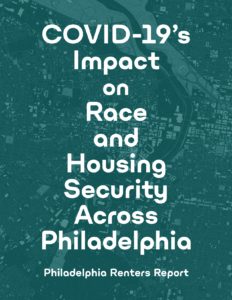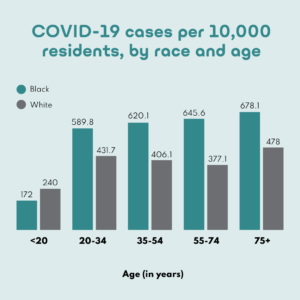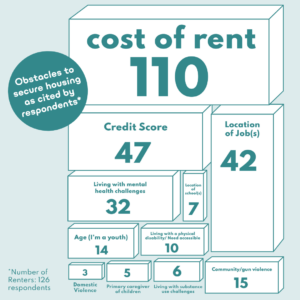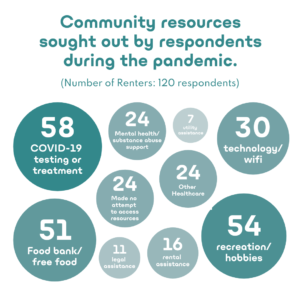Report: Race, housing insecurity, and COVID-19 are connected
 February 26, 2021
Category: Featured, Long, Purpose
February 26, 2021
Category: Featured, Long, Purpose
Community Legal Services of Philadelphia (CLS) commissioned COVID-19’s Impact on Race and Housing Security Across Philadelphia: Philadelphia Renters Report to identify to what extent Black and other communities of color which are experiencing high rates of COVID-19 are experiencing, or at risk of, eviction and other forms of housing instability.
 43% of those surveyed lost employment due to COVID-19, and nearly 60% have lost income (or hours worked) since the pandemic began. Generocity asked Rasheedah Phillips, CLS’s managing attorney of housing policy, what else the city needs to do to aid vulnerable residents.
43% of those surveyed lost employment due to COVID-19, and nearly 60% have lost income (or hours worked) since the pandemic began. Generocity asked Rasheedah Phillips, CLS’s managing attorney of housing policy, what else the city needs to do to aid vulnerable residents.
“Some of the solutions that focus group participants shared were on rent stabilization or rent control, forgiveness or cancellation of rental debt, housing credits or vouchers. Others also emphasized access to a livable wage as key for whenever the pandemic lifts and jobs come back,” said Phillips.
“What the report emphasizes is that we did not get here as a city overnight or over the past year,” Phillips added. “Residents who did not have access to a livable wage prior to the pandemic are those who are facing housing insecurity now and will continue to. All of these considerations are interlinked, and we must treat them as such in order to see any meaningful progress.”
About 47% of renters are concerned or very concerned about making rent and a quarter are concerned about being evicted in the next four to six months. Where does CLS recommend renters turn to for aid?
There will be another round of emergency rental assistance called Phase 4 that tenants can access beginning sometime in March. Landlords and tenants can access additional information here.
“The results confirmed what we expected about those relationships, but it was still shocking to see the numbers and maps highlighting the extent to which race, housing insecurity, and COVID-19 are connected,” Philllips said, “and data making clearer that pre-existing housing insecurity and failures to adequately address structural housing inequities left Black and brown communities more exposed to the virus.”
Phillips said it was also startling to read through the transcripts in significant detail what people have been experiencing during the pandemic.
“Often when our clients come to us, we have to focus on their immediate housing issues and needs, and there is usually not enough time to hear fuller details of what they are experiencing in their lives,” she said. “Having focus groups gave us the opportunity to learn in more detail all of the challenges that renters are experiencing in every facet of their lives — how the pandemic is impacting children, mental health, employment, relationships and more.”
People were also able to share solutions and visions for stable and healthy lives beyond the pandemic.
The CLS Housing unit provides legal representation and advice to tenants who are facing housing insecurity through evictions, substandard housing, illegal evictions and other means. Tenants are still having cases filed against them in eviction court.
Phillips said having legal representation is particularly significant at this time; despite the successes of various eviction moratoria, the eviction diversion program, rental assistance, and other protections and resources, many tenants are still unable to access them due to lack of notice, confusion, inconsistent enforcement, illegal evictions, and other reasons.
The organization’s attorneys help tenants navigate the court process, negotiate agreements to stay or time to move, and in some cases, can negotiate rental agreements that can fit a tenant’s budget. With attorneys, tenants can negotiate better outcomes that don’t bar them from future housing, ensuring access to future affordable housing.
CLS is currently advocating at the local, state, and federal level for extending and strengthening the federal eviction moratoria, and ensuring that tenants are informed about these protections, can utilize them, and can continue to access their services remotely.
“We continue to advocate for changes to rental assistance programs that will remove barriers to access,” Phillips said. “We are also advocating for tenant protections such as the right to counsel for eviction, and eviction sealing measures that will help avoid the devastating impact of evictions and help ensure that eviction records don’t haunt tenants for life, particularly as more tenants become at risk for eviction due to the collateral damage of COVID-19.”
CLS also supports the efforts of the eviction diversion program in bringing together tenants, landlords, volunteer mediators and non-profit housing counselors to work out agreements with stabilizing resources in a supportive environment that prioritizes resolution, not displacement.
Having a more in-depth analysis of the relationship between housing and COVID-19, paired with data about the disparate impact of COVID-19 on Black people and people of color, will allow CLS to better respond to clients who are facing loss of housing during and after the pandemic.
The renter’s report also highlights mutual aid groups as being a major support and resource for them during this time, particularly where government aid has been inadequate or difficult to access.
Participants noted that mutual aid groups provided “groceries, some transportation, they pick up medication, some offer financial help” and that they also obtained emotional support, alleviation from isolation, and a sense of community and solidarity through mutual aid.
CLS plans enhanced community education, targeted outreach, collaboration with housing movement and activist groups, and improved client identification in the particularly affected identified communities.
“We will continue connecting with community groups and impacted people to collaborate on developing solutions to issues at the intersection of the pandemic, health, and housing,” Phillips said.
Trending News











